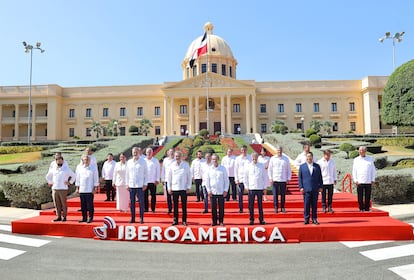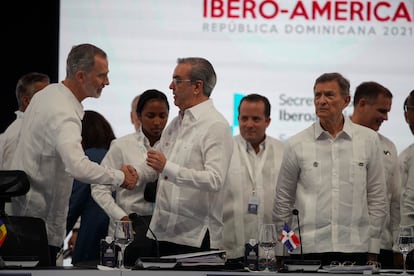Ibero-American Summit strengthens position despite divisions
The success of the conference lies in its acceptance that while governments in the region do not share the same ideology, they share a common destiny

Years ago, many had given up the Ibero-American Summit as useless. But despite its divisions and weakness, the Summit — which brings together 22 Spanish and Portuguese-speaking countries in Latin America and Europe — is becoming stronger. On Saturday, the 28th Ibero-American Summit was held in Santo Domingo in the Dominican Republic, marking the 29th meeting since its inaugural summit in the Mexican city of Guadalajara in 1991. And a date has already been set for the next summit, which will take place in Quito, Ecuador, on November 29, 2024. In comparison, the Community of Latin American and Caribbean States (Celac) has celebrated seven summits in 15 years, while the Union of South American Nations (USAN) has not met since 2014.
The summit on Saturday was attended by 13 delegations, just two less than the number that attended the last in-person summit before the pandemic, which was held in Antigua, Guatemala in 2018. Spain was represented by Prime Minister Pedro Sánchez and King Felipe VI, while Portugal also had two representatives: President Marcelo Rebelo de Sousa and António Costa.
The most notable absence was Mexico. Mexican President Andrés Manuel López Obrador rarely travels abroad, but his absence my indicate that he has not forgiven Felipe VI for not replying to his letter demanding an apology from the crimes of the Spanish colonization of the Americas. What’s more, instead of sending a minister to represent him at the summit — as other presidents who were unable to attend did — he sent his undersecretary for Latin America.
The president of Brazil, Luiz Inácio Lula da Silva, was also notably absent, but unlike López Obrador, he had an explanation: he was unable to attend due to a planned trip to China, which in the end he had to cancel after falling ill with pneumonia. In his stead, he sent Foreign Minister Mauro Vieira to represent him. After the distance of former Brazilian president Jair Bolsonaro, the Ibero-American Summit trusts that Lula will assume a leadership role in the region and organize the 2026 summit.
The other no-shows were expected: the president of Peru, Dina Boluarte, who cannot leave the country without permission from Congress, and Venezuelan leader Nicolás Maduro, who, according to his vice president Delcy Rodríguez, got a false positive result for Covid. Only two of the six leaders in Central America attended the summit. The absence of the heads of state from Nicaragua, Panama, El Salvador and Guatemala meant that King Felipe’s traditional breakfast with Central American leaders had to be cancelled. However, the president of Honduras, Xiomara Castro, did attend the summit, where she was the only female leader present.
The success of the Ibero-American Summit lies in its acceptance that, while governments in the region do not share the same ideology, they share a common destiny. “We are all passengers on the same ship. Nobody is saved by themselves,” said Argentine President Alberto Fernández. However, there continue to be political divides, and unlike before, they no longer fall down clear left vs right lines.
While Chile’s Gabriel Boric represents a left-wing government, he has been one of the loudest critics of Nicaragua, which is ruled by Daniel Ortega and his wife Rosario Murillo. At the summit, Boric accused the couple of running a “family dictatorship” and spoke out against Nicaragua’s decision to strip nearly 300 political prisoners and exiles of their citizenship. In response, Nicaragua’s Foreign Minister Denis Moncada replied that “[Boric] should not use Nicaragua to hide his betrayal of the Chilean people and his submission to the North American empire and its allies.”
There was also division over Pedro Castillo, the former president of Peru who was imprisoned after launching a self-coup. Colombian President Gustavo Petro said he should be attending the summit, arguing that Castillo was the victim of the coup. Peru’s Minister of Foreign Affairs Ana Cecilia Gervasi replied: “If Pedro Castillo is not here, it’s because he staged a coup. If he was here, you would have a dictator.”

The president of Costa Rica, Rodrigo Chaves, also spoke out about the crisis in Haiti, stressing that the entire international community — not just the neighboring Dominican Republic — must address the situation.
Consensus
At the Ibero-American Summit, decisions are made by consensus, and that leads to difficult balancing acts. The negotiations to reach a common position on the invasion of Ukraine (which Nicaragua, Venezuela, Cuba, Bolivia and El Salvador did not condemn at the United Nations) ended in a timid declaration in defense of the sovereignty and territorial integrity of nations, within the framework of the United Nations Charter. According to diplomatic sources, Ukraine isn’t even mentioned in the declaration.
This lack of consensus also meant that one of the most important documents of the summit — a commitment to create a new financial architecture — was not approved. Due to opposition from Cuba, the document was replaced with a single-paragraph communiqué highlighting “the need for a structural reform of international financial architecture to allow a greater flow of resources for sustainable development and to expand the credit limits that Ibero-American countries have in accessing financing.”
The summit did, however, approve the Ibero-American Cooperation Action Plan 2023-26, the Environmental Charter (also known as the Green Pact), the Charter of Principles and Rights in Digital Environments and the Food Security Strategy. The leaders at the summit warned that climate change represents a great risk for the region, as well as an opportunity to strengthen economic integration. According to CEPAL, interregional trade only represents 19.2% of the total.
Spanish Prime Minister Pedro Sánchez confirmed that the European Union will present a strategic investment package for the region at the CELAC summit scheduled for July 17 and 18 in Brussels. In the second half of this year, a migration forum will also be held in Ecuador to address a problem that directly or indirectly affects all the countries of the region.
Sign up for our weekly newsletter to get more English-language news coverage from EL PAÍS USA Edition
Tu suscripción se está usando en otro dispositivo
¿Quieres añadir otro usuario a tu suscripción?
Si continúas leyendo en este dispositivo, no se podrá leer en el otro.
FlechaTu suscripción se está usando en otro dispositivo y solo puedes acceder a EL PAÍS desde un dispositivo a la vez.
Si quieres compartir tu cuenta, cambia tu suscripción a la modalidad Premium, así podrás añadir otro usuario. Cada uno accederá con su propia cuenta de email, lo que os permitirá personalizar vuestra experiencia en EL PAÍS.
¿Tienes una suscripción de empresa? Accede aquí para contratar más cuentas.
En el caso de no saber quién está usando tu cuenta, te recomendamos cambiar tu contraseña aquí.
Si decides continuar compartiendo tu cuenta, este mensaje se mostrará en tu dispositivo y en el de la otra persona que está usando tu cuenta de forma indefinida, afectando a tu experiencia de lectura. Puedes consultar aquí los términos y condiciones de la suscripción digital.








































